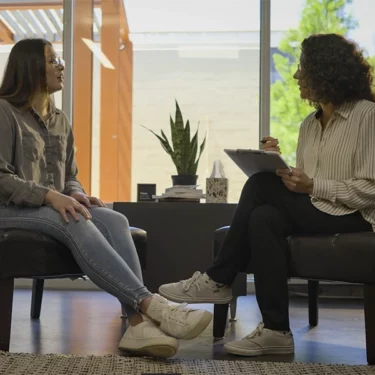Recovery from a mental health or substance use challenge doesn’t happen alone.
As the pandemic has pushed more people to seek treatment for mental health and substance use challenges, the courageous work of those throughout the health care continuum – the professionals who provide physical health and mental health treatment and services – has become more evident.
I am especially grateful to those who provide mental health and substance use treatment and services.
We must tell their stories, celebrate their selfless dedication and acknowledge their work to improve the wellbeing of those they care for. They are the ones who make sure no one travels alone on the road to recovery.
Peer support specialists represent a unique link in the continuum of care because of their efforts to help clients who seek mental health and substance use treatment. It’s likely many people have never interacted with a peer support specialist, but their role is invaluable. They support the work of therapists, case managers and physicians as part of a coordinated effort.
Peer support specialists also identify as current or former recipients of mental health or substance use treatment and services who support other individuals living through similar experiences. They have what we call lived experience. That means they have experienced a mental health or substance use crisis.
Their experience equips them with the knowledge, credibility and empathy to help others in crisis. They provide the human connection that people in crisis need so they don’t have to travel the road to recovery alone.
There are so many courageous peer recovery specialists in our field who deserve credit.
People like Bonnie Gilmore, a recovery coach for Rockford, Illinois-based Rosecrance Health Network, where she works with people who have serious mental illness to help them overcome barriers and provides vital assistance for those in psychiatric crisis.
People like Lisa Fuller, housing lead case manager at Berks Counseling Center in Reading, Pennsylvania, for more than 15 years providing housing and case management support for chemically dependent pregnant and parenting women and their children who are homeless.
People like Lisa St George, vice president of peer support and empowerment at Phoenix, Arizona-based RI International, where she educates others about mental illness through research and training programs and has helped develop national standards used to train nearly 15,000 peer support specialists globally.
These are the courageous people who use their lived experience to help others receive the treatment and services they need to survive, who try every day to eliminate the stigma surrounding mental health and substance use challenges, who work with legislators in their state to fund life-saving programs, who establish networks in their communities to ensure that their clients have access to services.
The National Council represents many accomplished peer support specialists, but the work of Gilmore, Fuller and St George stands out. That’s why the National Council has presented each of them with our Peer Specialist Award, which recognizes those with lived experience who work in mental health and addiction recovery and use their wisdom and strength to help peers on their own road to recovery.
Now lawmakers are beginning to understand the crucial role of peer support specialists and have introduced a bill to boost their numbers and improve the delivery of treatment and services.
The Promoting Effective and Empowering Recovery Services (PEERS) in Medicare Act of 2021, sponsored by Senators Catherine Cortez Masto (D-Nev.) and Bill Cassidy (R-La.), would expand access to peer support services for mental health and substance use challenges and allow more patients to access peer support treatment by ensuring primary care physicians can bill this service to Medicare, according to a story in Mental Health Weekly.
The Mental Health Liaison Group, a lobbying effort that the National Council is part of, supports the bill.
“This legislation recognizes the unique role of peer support specialists as they complement therapists, case managers and physicians as part of a coordinated team. Peer support promotes recovery by helping individuals better engage in services, manage physical and mental health conditions, build support systems and, ultimately, live self-directed lives in their communities,” the Mental Health Liaison Group said in a statement.
Peer support specialists reduce hospital admission rates, increase social support and social functioning and decrease substance use and depression, according to the Substance Abuse and Mental Health Services Administration (SAMHSA).
But most importantly, peer support specialists make sure no one travels alone on the road to recovery.


